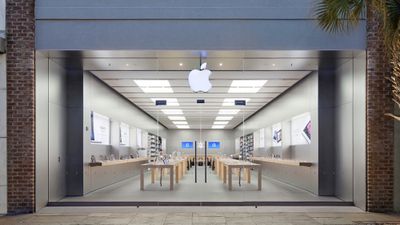Apple Closes South Carolina Store After COVID-19 Exposure, Other Stores Cutting Hours Due to Staff Shortages
Apple has temporarily shut down its retail store located in Charleston, South Carolina after more than 20 staff members were exposed to or tested positive for COVID-19, reports Bloomberg.

According to the website for the store, it will be shuttered until Monday, August 23. According to Bloomberg, stores of this size typically have 70 to 80 employees, so around a quarter of the staff may have been exposed.
Apple appears to be suffering from staff shortages at the Charleston store and other retail locations, both because of COVID exposures and the difficult labor market. Stores remain operational at this time, but some have been forced to close earlier and open later because of a lack of staff.
Continuing issues with the delta variant of COVID-19 have impacted Apple's store plans. Apple stopped requiring customers and employees to wear masks back in June, but then reinstated mask mandates at many retail locations in the United States in late July. So far though, Apple has not reinstated widespread store shutdowns.
Apple had also planned to bring back in-person Today at Apple classes on August 30, but has since pushed back those plans because of the prevalence of the delta variant.
Note: Due to the political or social nature of the discussion regarding this topic, the discussion thread is located in our Political News forum. All forum members and site visitors are welcome to read and follow the thread, but posting is limited to forum members with at least 100 posts.
Popular Stories
Apple is planning to launch new MacBook Pro models as soon as early March, but if you can, this is one generation you should skip because there's something much better in the works.
We're waiting on 14-inch and 16-inch MacBook Pro models with M5 Pro and M5 Max chips, with few changes other than the processor upgrade. There won't be any tweaks to the design or the display, but later this...
Wednesday February 11, 2026 10:07 am PST by
Juli CloverApple today released iOS 26.3 and iPadOS 26.3, the latest updates to the iOS 26 and iPadOS 26 operating systems that came out in September. The new software comes almost two months after Apple released iOS 26.2 and iPadOS 26.2.
The new software can be downloaded on eligible iPhones and iPads over-the-air by going to Settings > General > Software Update.
According to Apple's release notes, ...
It has been a slow start to 2026 for Apple product launches, with only a new AirTag and a special Apple Watch band released so far. We are still waiting for MacBook Pro models with M5 Pro and M5 Max chips, the iPhone 17e, a lower-cost MacBook with an iPhone chip, long-rumored updates to the Apple TV and HomePod mini, and much more.
Apple is expected to release/update the following products...
Apple plans to announce the iPhone 17e on Thursday, February 19, according to Macwelt, the German equivalent of Macworld.
The report said the iPhone 17e will be announced in a press release on the Apple Newsroom website, so do not expect an event for this device specifically.
The iPhone 17e will be a spec-bumped successor to the iPhone 16e. Rumors claim the device will have four key...
Apple acquired Canadian graph database company Kuzu last year, it has emerged.
The acquisition, spotted by AppleInsider, was completed in October 2025 for an undisclosed sum. The company's website was subsequently taken down and its Github repository was archived, as is commonplace for Apple acquisitions.
Kuzu was "an embedded graph database built for query speed, scalability, and easy of ...





















